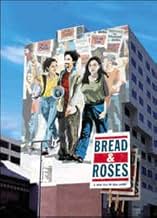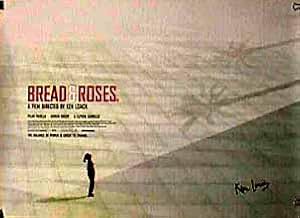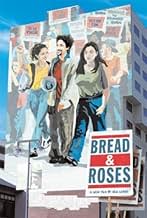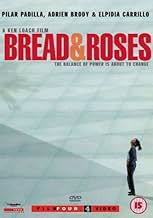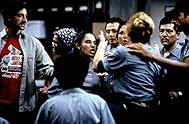Bread and Roses
- 2000
- Tous publics
- 1h 50min
NOTE IMDb
7,0/10
6,3 k
MA NOTE
Ajouter une intrigue dans votre langueTwo Latina sisters work as cleaners in a downtown office building, and fight for the right to unionize.Two Latina sisters work as cleaners in a downtown office building, and fight for the right to unionize.Two Latina sisters work as cleaners in a downtown office building, and fight for the right to unionize.
- Récompenses
- 5 victoires et 10 nominations au total
Frankie Davila
- Luis
- (as Frank Davila)
Eloy Méndez
- Juan
- (as Eloy Mendez)
Avis à la une
I have a deep sympathy & connection with this movie, because two of my dearest friends were Spanish-speaking cleaners in the UK (although completely legally). Now - through ridiculously hard work and frugal living - they are bilingual, educated, skilled, and making a decent life back in their home country, where I hope to visit them one day.
As such, I can tell you that this film is so true-to-life it brought tears to my eyes. It also has moments of laughter and comedy, and an extremely important message to anyone working for low wages and low respect, and an equally important kick up the backside to people like me who never think we're paid enough, and forget about the 'invisible' people earning half our wages for doing twice the workload.
The actors (many of them cleaners in real life) are never less than excellent, and you have no trouble believing every scene. I encourage anyone to watch this movie, as it has an almost Shawshank-like feelgood factor, but is much more poignant and relevant than even that great film.
The additional programme on the DVD is not as informative as I expected (being more 'fly-on-the-wall' than documentary), but still packs a powerful emotional punch, and really adds to your appreciation of the reality behind the movie.
As such, I can tell you that this film is so true-to-life it brought tears to my eyes. It also has moments of laughter and comedy, and an extremely important message to anyone working for low wages and low respect, and an equally important kick up the backside to people like me who never think we're paid enough, and forget about the 'invisible' people earning half our wages for doing twice the workload.
The actors (many of them cleaners in real life) are never less than excellent, and you have no trouble believing every scene. I encourage anyone to watch this movie, as it has an almost Shawshank-like feelgood factor, but is much more poignant and relevant than even that great film.
The additional programme on the DVD is not as informative as I expected (being more 'fly-on-the-wall' than documentary), but still packs a powerful emotional punch, and really adds to your appreciation of the reality behind the movie.
When I attended a screening a week ago sponsored by a local public supported radio station (KPFK) in Los Angeles, I was not certain if this film was a documentary or typical crafted Hollywood-style hyperbole since I listened with half an ear while jogging and listening to an opportunity to attend.
Who would have thought that a simple discussion on a local public supported radio station in Los Angeles (KPFK) a few years ago would compel a screenwriter (Paul Laverty) to visit a union organizing effort in downtown Los Angeles (circa 1999) resulting in a film that was drama, comedy, farce, fear, compassion and a taste of dusted immigrants creeping through Tijuana-to-USA shrubs to gain entry via the abusive "coyotes" human smuggler routes. Most of these immigrants land in day-worker situations and low pay and yet Los Angeles would collapse without them. This film concentrates on the downtown office area -- owned and occupied by the elite of Los Angeles establishment - and where many undocumented workers toil under conditions that are far less than that suggested by international Human Rights standards.
This was a polished non-Hollywood-capability-film but yet intimately Los Angeles. I listened to an interview yesterday on KPFK with Laverty and learned that funding was elsewhere - Europe I recall - not 'Hollywood'. And Laverty is from Scotland. One would never guess that the film was actually on the low-budget scale when compared with Hollywood's pleasure to spend big dollars.
I also learned that the film was made in 30-days (hence the vibrant interaction of all cast members and energetic direction by Loach) and is in release this week with 30 prints in Los Angeles, and 300 nationwide USA. Sounds like some symmetry there and potential Lottery pick permutations.
My only reservation is that the story is highly political in an undercurrent nature and may frighten an extensive audience --- unless the viewers just take the courage to go, watch, and enjoy. The film will do the rest. The viewer will leave with more than the cost of a matinee price ticket.
I also suggest that in an upcoming meeting between Vicente Fox, President of Mexico, and George W. Bush, President of United States, that Vicente snag a copy of the film and show it to George while sipping tea in Texas. And then for dessert, sip more tea and watch "Traffic".
Who would have thought that a simple discussion on a local public supported radio station in Los Angeles (KPFK) a few years ago would compel a screenwriter (Paul Laverty) to visit a union organizing effort in downtown Los Angeles (circa 1999) resulting in a film that was drama, comedy, farce, fear, compassion and a taste of dusted immigrants creeping through Tijuana-to-USA shrubs to gain entry via the abusive "coyotes" human smuggler routes. Most of these immigrants land in day-worker situations and low pay and yet Los Angeles would collapse without them. This film concentrates on the downtown office area -- owned and occupied by the elite of Los Angeles establishment - and where many undocumented workers toil under conditions that are far less than that suggested by international Human Rights standards.
This was a polished non-Hollywood-capability-film but yet intimately Los Angeles. I listened to an interview yesterday on KPFK with Laverty and learned that funding was elsewhere - Europe I recall - not 'Hollywood'. And Laverty is from Scotland. One would never guess that the film was actually on the low-budget scale when compared with Hollywood's pleasure to spend big dollars.
I also learned that the film was made in 30-days (hence the vibrant interaction of all cast members and energetic direction by Loach) and is in release this week with 30 prints in Los Angeles, and 300 nationwide USA. Sounds like some symmetry there and potential Lottery pick permutations.
My only reservation is that the story is highly political in an undercurrent nature and may frighten an extensive audience --- unless the viewers just take the courage to go, watch, and enjoy. The film will do the rest. The viewer will leave with more than the cost of a matinee price ticket.
I also suggest that in an upcoming meeting between Vicente Fox, President of Mexico, and George W. Bush, President of United States, that Vicente snag a copy of the film and show it to George while sipping tea in Texas. And then for dessert, sip more tea and watch "Traffic".
I don't know why but I've always had good interactions with janitors. Why should there be a reason? I respect their jobs: if a floor is shiny from having just been cleaned, I wouldn't dare stick my muddy shoes on it. Just like 'garbage men' these people's jobs consist of handling 'unwanted' stuff but unlike what Luis (Frank Davila) said, I don't think their uniform make them invisible, it is just that the world has turned so competitive and greed-driven that we all keep our chins up to get a share on the dream without caring much from the reality lying beneath us.
And it takes directors like Ken Loach to open our eyes on such realities, "Bread and Roses" -whose title derives from a poem turned into union slogan for industrial (lowly paid) workers- sheds the lights on the working conditions of janitors in Los Angeles, mostly South American immigrants who're not even acknowledged a right to unionize or get insurance. It's not about what you can do for a job but also what a job can do for you. But obviously, these people are at the bottom of the social pyramid and should value their luck for having wages, wages of fear or wages of wrath, wages anyway.
And so Loach provides a sort of behind-the-scenes look on the struggle of these unglamorous people who dance with the vacuum cleaner and empty our wastebaskets. It's not exactly a leftist tribute to the working man but a social commentary and a human study on the way they're often overlooked even by Hollywood itself. Indeed, go give me a film about maids or janitors that is not a Cinderella story. In "Bread and Roses", we look at janitors beyond their uniforms, they have kids, they have daily strugles to deal with, they have dreams too like Luis who wants to become a lawman. They are different: some are political, some don't care, it's not your monolithic group and Loach never tries to pull a Capra on his material.
The heroine is Maya (Pilar Padilla) who gets a job as a janitor from her sister Rosa (Elpidia Carilla) , both women are strong in different ways. Maya is a plucky little woman who illegally enters the territory, it's interesting that Loach teases us by not allowing the human traffickers to let her go join Rosa because she didn't give enough money. Five minutes later, she'll be back but there was one scene needed to introduce Maya as resourceful, funny and capable to survive, I won't spoil it, it's both funny and realistic, and she's pretty enough to lure any guy into it, better use the power you got. That character-establishing moment works because we do believe she can spend hours wandering around her building waiting for someone to connect to, work as a waitress and have great come-backs to some macho slurs.... then get a janitor's ob and even do an elevator prank her very first day. Such girls can get away with it.
Rosa has more years behind her, more experience, she's got a sick husband (Jack McGee) and a daughter, she could have used a line from another 2000s film "I have a family, I don't have the luxury of principles". Rosa knows it's not that the job offers enough to live, but that no job at all would just make living impossible, and when you have kids or a man who needs an operation, you'd be likely to kick any Ivy League long-haired "union" propagandist off your house. Sam Shapiro is that guy, he is introduced in a funny almost cartoonish way, trying to escape from three men, you've got to have the makings of a true con artist and in some funny twist, his methods match Maya's own resourceful nature. It's obvious from the start that a woman like Maya will be more receptive to the cause lead by Sam, both actors have great chemistry.
But it's a lost cause for Rosa, even when submitted paycheck from 1982 workers revealing that wages have decreased and right for health insurance cut out (that's the paper Sam retrieves) she refuses to hear the truth. In a way she agrees with Sam: big corporations will always win because workers depend more on their jobs than they do on workers. It's a psychological arm-wrestling and the solution doesn't come from a magic hat but for pressure, harassment and some media bait-and-switch stunts. Loach never makes the nerdy Brody a romantic Robin Hood but an overly idealistic protester ignorant of some harsh realities. In fact the other side has a convincing representative in chief of staff Perez (George Lopez) who tells workers: . "Join the union and they'll ask your papers and tax your money".
The central figure remains Rosa who has one of the greatest moments in a Loach film when she explains why she has no scruples betraying the workers, revealing to Mata that it didn't take just money to get her on the other side of the border as she had to cross her own existential border toi., something that make female worker even more subjected to a new form of slavery. The dynamics of the film operate in a way that never indulges to black vs white exposition. Loach reckons the social reality through scenes of sheer anger, constructive debates and a remarkable moment when they act as party-poopers in a little Hollywood celebration featuring some real actors like Tim Roth or Ron Perlman..
The scenes works as a subtle little jab at Hollywood, a close neighbor to Los Angeles. Now, let me pay tribute to Sasheen Littlefeather who just passed away. What Brando said about her being booed and taken off stage sums up the spirit of that scene and the whole janitor's fight: "they're ruining our fantasy with a little intrusion of reality". In "Bread and Roses", Loach allowed reality to intrude itself with bravura and gusto... mucho gusto!
And it takes directors like Ken Loach to open our eyes on such realities, "Bread and Roses" -whose title derives from a poem turned into union slogan for industrial (lowly paid) workers- sheds the lights on the working conditions of janitors in Los Angeles, mostly South American immigrants who're not even acknowledged a right to unionize or get insurance. It's not about what you can do for a job but also what a job can do for you. But obviously, these people are at the bottom of the social pyramid and should value their luck for having wages, wages of fear or wages of wrath, wages anyway.
And so Loach provides a sort of behind-the-scenes look on the struggle of these unglamorous people who dance with the vacuum cleaner and empty our wastebaskets. It's not exactly a leftist tribute to the working man but a social commentary and a human study on the way they're often overlooked even by Hollywood itself. Indeed, go give me a film about maids or janitors that is not a Cinderella story. In "Bread and Roses", we look at janitors beyond their uniforms, they have kids, they have daily strugles to deal with, they have dreams too like Luis who wants to become a lawman. They are different: some are political, some don't care, it's not your monolithic group and Loach never tries to pull a Capra on his material.
The heroine is Maya (Pilar Padilla) who gets a job as a janitor from her sister Rosa (Elpidia Carilla) , both women are strong in different ways. Maya is a plucky little woman who illegally enters the territory, it's interesting that Loach teases us by not allowing the human traffickers to let her go join Rosa because she didn't give enough money. Five minutes later, she'll be back but there was one scene needed to introduce Maya as resourceful, funny and capable to survive, I won't spoil it, it's both funny and realistic, and she's pretty enough to lure any guy into it, better use the power you got. That character-establishing moment works because we do believe she can spend hours wandering around her building waiting for someone to connect to, work as a waitress and have great come-backs to some macho slurs.... then get a janitor's ob and even do an elevator prank her very first day. Such girls can get away with it.
Rosa has more years behind her, more experience, she's got a sick husband (Jack McGee) and a daughter, she could have used a line from another 2000s film "I have a family, I don't have the luxury of principles". Rosa knows it's not that the job offers enough to live, but that no job at all would just make living impossible, and when you have kids or a man who needs an operation, you'd be likely to kick any Ivy League long-haired "union" propagandist off your house. Sam Shapiro is that guy, he is introduced in a funny almost cartoonish way, trying to escape from three men, you've got to have the makings of a true con artist and in some funny twist, his methods match Maya's own resourceful nature. It's obvious from the start that a woman like Maya will be more receptive to the cause lead by Sam, both actors have great chemistry.
But it's a lost cause for Rosa, even when submitted paycheck from 1982 workers revealing that wages have decreased and right for health insurance cut out (that's the paper Sam retrieves) she refuses to hear the truth. In a way she agrees with Sam: big corporations will always win because workers depend more on their jobs than they do on workers. It's a psychological arm-wrestling and the solution doesn't come from a magic hat but for pressure, harassment and some media bait-and-switch stunts. Loach never makes the nerdy Brody a romantic Robin Hood but an overly idealistic protester ignorant of some harsh realities. In fact the other side has a convincing representative in chief of staff Perez (George Lopez) who tells workers: . "Join the union and they'll ask your papers and tax your money".
The central figure remains Rosa who has one of the greatest moments in a Loach film when she explains why she has no scruples betraying the workers, revealing to Mata that it didn't take just money to get her on the other side of the border as she had to cross her own existential border toi., something that make female worker even more subjected to a new form of slavery. The dynamics of the film operate in a way that never indulges to black vs white exposition. Loach reckons the social reality through scenes of sheer anger, constructive debates and a remarkable moment when they act as party-poopers in a little Hollywood celebration featuring some real actors like Tim Roth or Ron Perlman..
The scenes works as a subtle little jab at Hollywood, a close neighbor to Los Angeles. Now, let me pay tribute to Sasheen Littlefeather who just passed away. What Brando said about her being booed and taken off stage sums up the spirit of that scene and the whole janitor's fight: "they're ruining our fantasy with a little intrusion of reality". In "Bread and Roses", Loach allowed reality to intrude itself with bravura and gusto... mucho gusto!
In this movie, there are no purloined designer clothes to masquerade in, and Prince Charming doesn't come complete with a political career and a three-piece suit--he's a scruffy charmer in a baggy t-shirt with little more to offer than a megaphone and a cause.
This is a film made by a director who has to be spiritual kin to Michael Moore, but his subject matter is quite different. Here we see real immigrants (both legal and illegal) being used rather cynically by companies whose business plan includes hiring the most downtrodden and fearful and hand-to-mouth in our country, paying them the lowest possible wages, giving them absolutely no benefits whatsoever, and thereby winning contracts to provide custodial and other services over companies that pay a fair and living wage, plus benefits, to primarily unionized employees who are American citizens. You know this really happens. It does. The best remedy for the situation is certainly a matter for debate, but no matter what your political slant or position on labor unions and illegal immigrants, you will most definitely find food for thought herein.
OTOH, if you are also one of the drooling legions of newbie Adrien Brody fangirls, you will find even more food for thought. Brody is painfully cute in this movie-a piquant mixuture of earnest, funny, sincere, sweet, and fiery, topped off with a kinghell case of `bedhead'.
The three central players are Pilar Padilla, as idealistic illegal immigrant Maya, her overburdened sister Rosa, played by Elipidia Carillo, and Brody as Sam Shapiro, an organizer and activist for the cause. No fairy tale, this movie, though a few of the cast are reasonably good-looking. The cast, many of whom really are janitors and custodians, are as real as it gets. You can see a lifetime of hard labor and long hours in their faces, and the slump to their shoulders.
I really grew to like these struggling janitors and maids. None of them were "types"--they were all real people and their conflicts and concerns were illuminated very well, despite limited screen time being available to each. By treating these characters with respect and making them fully-fleshed out, it made the passion of the organizers for this particular cause more understandable, and not just as sometimes seems the case in some portrayals, a matter of someone who is bored or spoiled or has some sort of guilt-complex trying to find their identity and using do-gooderism as a means to that end. Through coming out from the shadows, and joining the great and messy American experience of organized dissent, you could practically see some of these characters changing into `Americans' before your eyes, no matter what their official papers might say. Thinking like Americans, standing up for their rights, making their voices heard. That's how it's supposed to work-isn't it? Isn't it?
If there are caricatures in this movie, then those would be some of the building administrators, but their screen time is so limited, and they are usually so surprised and besieged by Sam Shapiro's stunts and protests that their lack of articulate or sympathetic response seems realistic enough to me. But the one thing that stands out is more than anything else is the absolutely natural acting style. Nobody really seems to be "acting" in this movie. It's as if there was a very unobtrusive documentary maker following these folks around. The movie is, however, well-paced between scenes which are rousing or charming, and those which are raw and painful.
Although this movie is not a love story or romance, per se, Adrien's character does get some action in it. In fact, in one amusing scene, he is literally hauled into a janitor's closet by an enterprising female (smart girl!!) and snogged silly. One can but applaud that sort of enterprise and initiative on the part of a recent arrival to this great country of ours. That's the kind of can-do immigrant spirit that made this country great, and if I were there, I would be sure to tell her how much I admired that quality in her, when I visited her in the hospital to apologize for having accidentally whacked her out of the way with a long-handled mop.
But it can't all be funny and cute, and indeed, in this same section of the movie is a scene of such raw emotion, harsh language, honesty, and truth, between the two Mexican sisters that I cannot say I have ever seen anything like it. Even Ebert said in his review that it's the kind of scene that would win an Oscar if the Academy ever saw movies like this, which of course, they don't.
The ending is both feel-good triumphant, and bittersweet. I think that such an ending was very much in keeping with the tone and overall realism of this movie--yes, some things changed for the better, but for people like these, not everyone gets that happy ending and lives happily ever after. At least, not right away.
There's real passion here, on the part of everyone involved, and it feels genuine, not manipulative. It's a pleasure to see a movie with good quality production values and excellent acting which was made for a reason, not just to make money.
This is a film made by a director who has to be spiritual kin to Michael Moore, but his subject matter is quite different. Here we see real immigrants (both legal and illegal) being used rather cynically by companies whose business plan includes hiring the most downtrodden and fearful and hand-to-mouth in our country, paying them the lowest possible wages, giving them absolutely no benefits whatsoever, and thereby winning contracts to provide custodial and other services over companies that pay a fair and living wage, plus benefits, to primarily unionized employees who are American citizens. You know this really happens. It does. The best remedy for the situation is certainly a matter for debate, but no matter what your political slant or position on labor unions and illegal immigrants, you will most definitely find food for thought herein.
OTOH, if you are also one of the drooling legions of newbie Adrien Brody fangirls, you will find even more food for thought. Brody is painfully cute in this movie-a piquant mixuture of earnest, funny, sincere, sweet, and fiery, topped off with a kinghell case of `bedhead'.
The three central players are Pilar Padilla, as idealistic illegal immigrant Maya, her overburdened sister Rosa, played by Elipidia Carillo, and Brody as Sam Shapiro, an organizer and activist for the cause. No fairy tale, this movie, though a few of the cast are reasonably good-looking. The cast, many of whom really are janitors and custodians, are as real as it gets. You can see a lifetime of hard labor and long hours in their faces, and the slump to their shoulders.
I really grew to like these struggling janitors and maids. None of them were "types"--they were all real people and their conflicts and concerns were illuminated very well, despite limited screen time being available to each. By treating these characters with respect and making them fully-fleshed out, it made the passion of the organizers for this particular cause more understandable, and not just as sometimes seems the case in some portrayals, a matter of someone who is bored or spoiled or has some sort of guilt-complex trying to find their identity and using do-gooderism as a means to that end. Through coming out from the shadows, and joining the great and messy American experience of organized dissent, you could practically see some of these characters changing into `Americans' before your eyes, no matter what their official papers might say. Thinking like Americans, standing up for their rights, making their voices heard. That's how it's supposed to work-isn't it? Isn't it?
If there are caricatures in this movie, then those would be some of the building administrators, but their screen time is so limited, and they are usually so surprised and besieged by Sam Shapiro's stunts and protests that their lack of articulate or sympathetic response seems realistic enough to me. But the one thing that stands out is more than anything else is the absolutely natural acting style. Nobody really seems to be "acting" in this movie. It's as if there was a very unobtrusive documentary maker following these folks around. The movie is, however, well-paced between scenes which are rousing or charming, and those which are raw and painful.
Although this movie is not a love story or romance, per se, Adrien's character does get some action in it. In fact, in one amusing scene, he is literally hauled into a janitor's closet by an enterprising female (smart girl!!) and snogged silly. One can but applaud that sort of enterprise and initiative on the part of a recent arrival to this great country of ours. That's the kind of can-do immigrant spirit that made this country great, and if I were there, I would be sure to tell her how much I admired that quality in her, when I visited her in the hospital to apologize for having accidentally whacked her out of the way with a long-handled mop.
But it can't all be funny and cute, and indeed, in this same section of the movie is a scene of such raw emotion, harsh language, honesty, and truth, between the two Mexican sisters that I cannot say I have ever seen anything like it. Even Ebert said in his review that it's the kind of scene that would win an Oscar if the Academy ever saw movies like this, which of course, they don't.
The ending is both feel-good triumphant, and bittersweet. I think that such an ending was very much in keeping with the tone and overall realism of this movie--yes, some things changed for the better, but for people like these, not everyone gets that happy ending and lives happily ever after. At least, not right away.
There's real passion here, on the part of everyone involved, and it feels genuine, not manipulative. It's a pleasure to see a movie with good quality production values and excellent acting which was made for a reason, not just to make money.
10co_iww
"Bread and Roses" is an engaging film about immigrant workers' struggles against poverty, state violence, and economic exploitation. I saw "Bread and Roses" at the Denver Film Festival thinking it was going to be a dry, lecturing documentary. Instead, it was a nuanced and complex dramatic depiction of powerful and engaging characters. It is rare to find such a politically charged film that is made so effective by presenting very human characters struggling with the contradictions of everyday life. It allows us to appreciate the tough choices we all make in conditions not of our own choosing--it allows us to explore issues outside of the knee-jerk judgments of good guy/bad guy and appreciate the very human responses to often inhuman circumstances we all participate in creating. The acting is generally very good, especially for a "low budget" production, but the main character's older sister delivers a monologue on her struggles with deprivation that still chills me to the bone even though I saw it months ago. Sorry for leaving out the details, but this is one film whose details you'll want to discover for yourself.
Le saviez-vous
- AnecdotesPrior to filming, Adrien Brody did undercover research as a union member in Los Angeles. He went to conventions and sat in on strike talks. A couple of the members recognized him, but Brody persuaded them not to blow his cover.
Meilleurs choix
Connectez-vous pour évaluer et suivre la liste de favoris afin de recevoir des recommandations personnalisées
- How long is Bread and Roses?Alimenté par Alexa
Détails
- Date de sortie
- Pays d’origine
- Site officiel
- Langues
- Aussi connu sous le nom de
- Pan y rosas
- Lieux de tournage
- Sociétés de production
- Voir plus de crédits d'entreprise sur IMDbPro
Box-office
- Montant brut aux États-Unis et au Canada
- 533 479 $US
- Week-end de sortie aux États-Unis et au Canada
- 49 662 $US
- 13 mai 2001
- Montant brut mondial
- 706 876 $US
- Durée1 heure 50 minutes
- Couleur
- Mixage
- Rapport de forme
- 1.85 : 1
Contribuer à cette page
Suggérer une modification ou ajouter du contenu manquant

Lacune principale
By what name was Bread and Roses (2000) officially released in India in English?
Répondre


